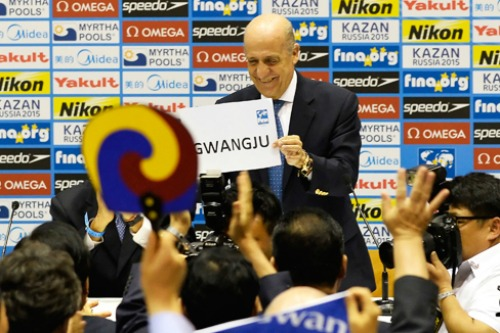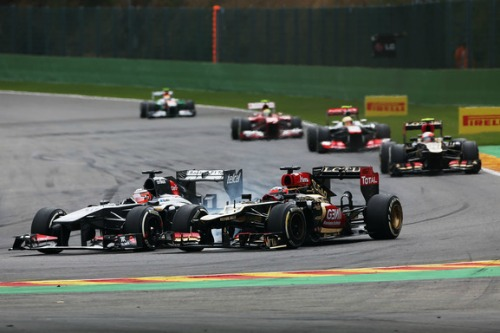In the era of globalization, we are witnessing many cities, regions and countries, which intensively compete for attracting diverse investment and resources. Global cultural events are one of their principal targets to hold. It includes the Olympic Games, the FIFA World Cup, and World Exposition. Of course, many policy makers and government officials believe that grand event would economically contribute to the hosting place. For attracting such events, the local government has changed its conventional role as the ‘manager’ or ‘protector’ for urban residents into an executive office of ‘city enterprise’. It might be possible to name such event-oriented and profit-driven urban development policy as ‘entrepreneurialism’. And, undoubtedly, such political transition is deeply related to the ‘neoliberal’ perspective on what the nature and role of government is in the age of globalization.

It has happened to the city where I reside in. A few weeks ago, the Metropolitan City of Gwangju was picked up as the host of the 2019 FINA World Swimming Championships. Local residents on TV celebrated the event as an opportunity to increase the rank the city of Gwangju up to the status of a ‘world city’. Many congratulating placards are already walled on the streets. Mayor Kang Un-tae, exalted by the news, gloriously announced on TV that the ‘global’ game, along with the 2015 FISU Summer Universiade, would bring enormous fortune and opportunities into the city. He emphasized that it would undoubtedly contribute to globally marketing the city of Gwangju itself, stimulating urban economic growth, expanding job opportunities, and up-grading local residents’ living conditions.
I hope his promise will come true, but the reality seems not that positive. There are several reasons for such a prospect. First, in a more general sense, the recent ‘entrepreneurial turn’ of urban and regional government policy leads the government to allot budget more for a ‘foreign-friendly’ or an ‘investment-friendly’ environment. The problem is the fact that such policy generates many programs that are not closely related to grassroots local residents. They principally include constructing a massive built-environment serving for visitors or tourists, aestheticizing the visual appearance of the urban landscape, and operating strategic marketing, servicing, and lobbying programs. For implementing these programs, the government cannot avoid creating an appropriate budget for the sectors regarded as relatively unproductive or inefficient. In many cases, the sectors include subsidies for economically disadvantaged groups, welfare services, and other public spending for residents.
Second, while hosting these ‘global’ events can increase job opportunities to a degree, the quality of newly-generated employment is less stable and desirable than that of locally-oriented sectors. The construction or remodeling projects of stadiums, museums, and conference halls create a certain number of jobs, but these jobs are usually filled by temporary contract physical laborers or part-time workers. On the contrary, major beneficiaries of these events are construction and property developer corporations, large property owners near the site of the event, and local elites and professionals involved in these events. The life-worlds of small mom-and-pop store owners and wage earners are literally far from what is going in the name of ‘global’ at their local place. Also, other possible jobs in the service sector for these events are also limited in their job stability and quality, because the period in which these ‘global’ events are held is no more than a month in many cases.

Third, at a long-term temporal scale, as we have witnessed in the case of Greece hosting the Olympic Games, the hosting local government should cope with not only with financial costs for debt but also the maintenance costs for the built environment. Hosting governments put in an enormous amount of money for these events, which is often followed by over-investment or the government’s deficit. Such financial policy subsequently increases local prices of goods and services, local tax rates, and eventually results in inflation. It is not uncommon to hear the news that the government of Gangwon Province in South Korea cannot escape from falling into deficit balance even if it can ‘successfully’ attract participants and tourists during the Pyongchang Winter Olympic Games.
In this context, I would like to introduce my readers to a short quote from the British feminist geographer Doreen Massey’s book 《For Space》(1995):
London is a world city for capital as well as for international migration. […] The financial City marks the city. […] Until the recent opening up of ‘property-development opportunities’ there, the City knew more about markets on distant continents than about what was happening just across the river. […] What is to be the economic strategy of the city? At present it is simply to prioritise finance and the key to world citydom. But the fact that London’s ‘success’ is one of the dynamics producing poverty and exclusion implies at least a query as to the meaning of this word ‘successful’ (Massey, 1995, 155-157) .
If the ‘city’ of London has undergone the economic development policy as its becoming the world financial ‘City’, then I would say that the city of Gwangju and its so-called ‘success’ can be summarized into its massive ambition to become the hub ‘City’ of Asian culture. Will the ‘success’ of Gwangju as an Asian Cultural Hub be the same with (or close to) the ‘success’ of the city of Gwangju and its local residents? At this moment in time, my response to the question is absolutely ‘No’.
Then whose success will it be? A clue to this question can be deduced from the earlier experiences from other metropolitan cities such as Seoul, Busan, and Daegu, which had held a series of larger ‘global’ events, such as world sports games, plenty of conferences and forums, and artistic exhibitions and festivals, and attracted an uncountable number of tourists, shoppers, and visitors. What is common in these cities cannot be legitimately addressed without mentioning current urban problems that they are faced with, such as socio-spatial polarization, dualization of the urban job market, and contrasting fragmentation of the urban landscape. Considering that, the city of Gwangju, of which the government ambitiously promotes to be an Asian Cultural Hub city, can follow not indifferent to the development trajectories that other cities have drawn recently. Then what can be an alternative? I believe there will be plenty of diverse answers. Yet, at the bottom of the line, I would like to argue that any policy or program that governments pursue should basically be nested on the issue of ‘what the city needs’ instead of ‘what the success of the City is’.
By Park Kyong-hwan, Associate Professor, Department of Geography Education
박경환 지리교육과 교수
tribune1968@cnumedia.com

